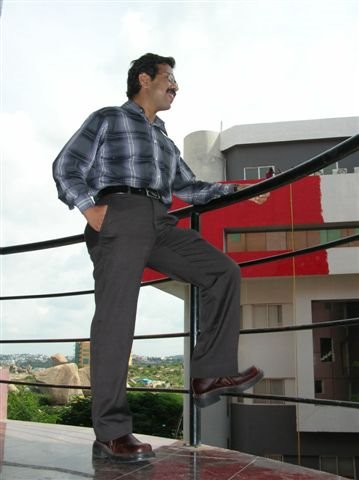I went to Shirdi for this Diwali-Eid holidays. I flew down from Hyderabad to Pune, and from there my friend and me drove down the State Highway to Shirdi via Ahmednagar. I had gone down this route twelve years back. In these last twelve years, parts of the State Highway has been converted to a spanky 4 lane highway – a toll road – while the rest of the highway remains pothole laden. The scenery on the road was as beautiful as you would expect: the rains have been excellent this year and the fields are green and yellow with sugarcane and mustard crops.
I have always fascinated by the faith that brings people together to the Sai Baba of Shridi. There were Hindus, Muslims and Sikhs, in the multitudes that thronged his Samadhi on this long weekend. To me this was Indian secularism at its vibrant best: a strongly emerging middle class praying for a future. What has changed in Shirdi is that there is now a large temple complex: complete with gardens, waiting halls, wonderfully designed silver layed sanctum. The town remains the same: crowded streets and haphazard buildings.
On the way back, we took a different route: the Pune-Nashik National Highway. In much better condition than the State Highway, it was double lane all throughout except for the last stretch near Pune. Predictably the last 4 lane portion of the highway is a toll road too. Altogether the toll costs were nearly 10% of the costs of fuel on the whole journey: too high a cost levied on account of years of neglect. On this route, the scenery was beautiful in a completely different way: the land is largely barren and the landscape is miles of grassy grazing lands dotted by the occasional tree and centuries-old igneous rock-faces.
We had taken this alternate route to stop at the Indage winery. The Nashik area has at least two major wineries: Sula Wines and Indage. Sula is run by Rajeev Sawant, a first generation entrepreneur who used to work in Oracle, California before he came back to India about 5 years back. The Indage is run by the Goa-based Chowgule group. Nashik is always known for its grape cultivation but it really took Rajeev Sawant to convert this advantage to a lifestyle business. In his early days, I had once emailed to Rajeev Sawant and he had promptly mailed me back. That is one sign of an entrepreneur who is likely to succeed: quick response to email. We did a wine tasting session at Café Indage. It helped me that the guy at the bar was from Bengal too. I am not a connoisseur but I do think that the Merlot and the Chenin Blanc were as good as I have tasted anywhere else in the world.
When I had planned the trip, I had imagined it would be the contrast of the traditional India at Shirdi and the modern India at the winery. Now that I have done the trip, the enduring image in my mind is that both institutions – the religious trust and the wine industry - have surged forward with the tide of their respective markets. And they are struggling to emerge out of a poor social and physical infrastructure. That is really the story of the two Indias.
Incidentally, the benefits of infrastructural investments, is evident in the story of my friend, Pankaj, with whom I made this trip. His company Scope T&M, India’s leading producer of test and measurement equipment for the power industry, is experiencing significant growth over the last few years in tandem with the investments in the sector. Scope is among the select few manufacturers of similar equipment across the world and has by far the lowest cost. They are now planning to introduce a electric powered wheelchair, their first consumer product. As I listen to him I think” “Is there still a story for Indian manufacturing?”. Perhaps the answer lies in a niche and specialized market with strong configuration and design components.
But then the heady concoction of all successful early stage ventures is a specialized skill, a gap in the market place and dollops of faith. It is the last where Shirdi comes in.
skip to main |
skip to sidebar

Sanjoy uses this conversation window to talk about and learn of business opportunities that will change his world and that of others. Please do feel free to comment on and propose ideas on new businesses or draw attention to any young venture that you find interesting.
Blog Archive
About Me

- Sanjoy Sanyal
- I grew up in Calcutta, studied at IIT Kharagpur and IIM Joka. I started my career with ICICI and ITC Classic, raising equity and debt finance. I then turned entrepreneur and founded a company called Aesthetic Technologies in the business of developing interactive content. I ran this company for five years and raised VC funding on the way. My last job was in the India management team of a global leader in the Talent Management software space: SumTotal Systems. I am currectly working as the COO of a new media-technology company promoted by one of India's most respected new media organizations. View my profile at http://www.linkedin.com/in/sanjoysanyal


